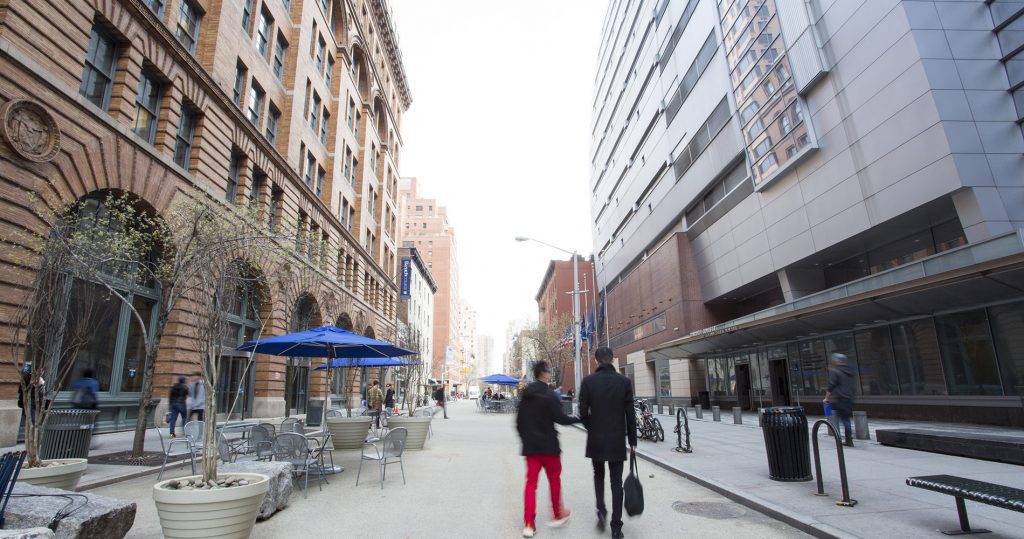Zicklin Ranked Third Nationwide for Women in IS

Sponsored Content
The Chronicle of Higher Education ranked the Zicklin School of Business at Baruch College third among 253 institutions nationwide for enrolling and graduating women in computer science and information systems. The percentage of female CIS undergrads at Zicklin has continuously increased over the last few years, from 21.6 percent in 2016 to 32.2 percent in 2019.
“The Paul H. Chook Department of Information Systems and Statistics has supported the creation of a student club, FemCode, that focuses on women in tech; we have made efforts to attract more female professors, both full time and adjunct; and we are working to increase the participation of women in computing and IT,” said Marios Koufaris, Ph.D., chair of the Paul H. Chook Department of Information Systems and Statistics.
In addition to the CIS major for undergraduates, Zicklin offers a Master of Science in Information Systems as well as a newly launched MS in Business Analytics and an Executive MS in Information Systems. The Zicklin School of Business leads the way in enrolling and graduating women in computer science and information systems—well-paying fields in which women have long been underrepresented.
Learn More:
MS in Business Analytics
MS in Information Systems
Executive MS in Information Systems
Coffee Brains, Case Writing, and More – New York News

Let’s explore some of the most interesting stories that have emerged from New York business schools this week.
This Is Your Brain On Coffee: Beyond Health Benefits, Even the Smell May Fuel Higher Test Scores – Stevens Institute of Technology College of Business Blog
New research published in the Journal of Environmental Psychology finally confirmed your suspicion: yes, your coffee is making you smarter. Well, maybe. Science is tricky and all that.
In the research, officially released earlier this year, Stevens School of Business professor Adriana Madzharov and colleagues from Temple and Baruch found that the scent of coffee helped people perform tasks better and even improved test scores. Interestingly enough, the researchers concluded that the effect of even just smelling coffee could be as beneficial as consuming it.
“It’s not just that the coffee-like scent helped people in our study perform better on analytical tasks, which was already interesting,” Madzharov writes. “But they also thought they would do better, and we demonstrated that this expectation was at least partly responsible for their improved performance. In short, smelling a coffee-like scent, which has no caffeine in it, still has a placebo effect similar to drinking coffee.”

New research reveals that the scent of coffee can help you with daily tasks and tests, even if you do not consume it.
She adds, “This finding also has useful multiple practical implications in business for workplace professionals, architects, building developers, retail space managers and others.”
You can read the full article here.
A Rutgers Team Brings a Professor’s Lesson to Life – Rutgers Business School Blog
Rutgers Business School Professor of Marketing Can (John) Uslay recently took home first place in a recent case-writing competition put together by the University of Michigan’s William Davidson Institute.
Professor Uslay’s entry was based on Roshni Rides, a “rickshaw transportation company created and piloted by a team of Rutgers Business School students,” which won the “$1 million Hult Prize for social entrepreneurship in 2017 after a compelling presentation about how their company could help improve the lives of refugees living in the Orangi Town settlement.
Professor Uslay outlined “the challenges the team faced, specifically their effort to find a price point that would keep the cost of the service affordable and still enable the company to grow.”
You can check out the full interview with Professor Uslay here.
The Business Case for Sustainable Tourism Management of Protected Areas – SC Johnson Business Feed
Tom Olson, a recent Johnson Cornell MBA graduate, recently published an op-ed about the growing need for “developed, emerging, and frontier markets” to develop more sustainable management structures to accommodate increased tourism.
Enter the Tourism and Protected Area Specialist (TAPAS) Group; a subgroup of the International Union for the Conservation of Nature (IUCN) “dedicated to advancing sustainable tourism initiatives in protected areas.”
Olson writes that he was tasked by TAPAS Group to “analyze, develop, and recommend a revenue generation model that would be financially sustainable, align with IUCN’s values, and be accepted by the broader community of sustainable tourism professionals.”
You can read Olson’s full op-ed here.
New York City’s Work/Life Balance Problems, and More – New York City News

Let’s explore some of the most interesting stories that have emerged from New York City business schools this week.
Would You Like Your Boss to be Fined for Making You Reply to Emails? – NBC News
Lehigh University College of Business and Economics management professor Liuba Belkin’s work was recently cited by NBC News regarding a potential new NYC law that would effectively ban workers from being forced to reply to after-hours emails and other messages. The reason behind the proposed law is that the increasingly common practice in the U.S. is decreasing work-life quality, which was a provincial point of Belin and co-author William J. Becker’s study “Exhausted, but Unable to Disconnect: After-Hours Email, Work-Family Balance and Identification.”
The potential new law would not effectively ban those from sending messages after hours, but being forced to work off-the-clock would be subject to a fine of around $500 for each offense. France, NBC News writes, passed a similar law in 2017 “requiring businesses with 50 or more employees to negotiate after-hours email rules with workers, potentially allowing them to ignore post-work correspondence.”
Human resources manager Steve Wang thinks the lofty comparison to France’s work culture is not as easy in the U.S. The country has stricter labor laws, instituting 35 hour max work weeks, and a law preventing people from working 4.5 hours straight without any breaks, for instance.
Click here to read more about the law and Belin’s study.
What are the Best Healthcare MBAs You Can Find in New York City? – MetroMBA
Four of the best health care MBA programs reside in New York; three of which fall right inside the five boroughs. Columbia Business School, the Zicklin School of Business at Baruch College, the Stern School of Business at NYU, and the SC Johnson Graduate School of Management at Cornell in Ithaca each offer exemplary healthcare management learning options for any hopeful MBAs, some of which are coupled with dual degrees.

Zicklin’s Executive MBA in Healthcare Administration is one of the few programs in the New York metro that has both AACSB and CAHME accreditation.
Find out more about the best healthcare MBAs you can find in New York here.
Daniel A. D’Aniello speaks on the value of mentorship in driving success – Johnson SOM Blog
Cornell University’s SC Johnson Graduate School of Management recently hosted Carlyle Group co-founder and former Marriot VP of Finance and Development Daniel A. D’Aniello at this year’s Lewis H. Durland Memorial Lecture.
D’Aniello used the talk as an opportunity offer invaluable entrepreneurship, stewardship, and mentorship advice to Johnson students from his distinguished career as co-founder of one of the world’s largest investment firms. He also “emphasized the importance of humility in recognizing one’s errors and understanding how to spend one’s time.” He elaborates:
“Allocate your valuable time to things that are going to scale, grow, and become profitable. Time is your highest opportunity cost.”
You can read more highlights from D’Aniello’s talk here.
What They’re Saying: Spring Break is Sadly Almost Over

While the East Coast of the U.S. is catching up with another pleasant April storm cyclone, the rest of the business school community is back at work, shedding off the sunburned skin of a spring break well had. With the end of the formal academic year drawing near, students are preparing for the home stretch.
Check out some of the things business schools around the U.S., Canada, and UK are saying about the end of spring break and what you need to know before the academic year closes out.
Spring Break is almost over. It’s time to start thinking about Summer! Register tpdayfor @BaruchCollege #summersession courses & finish your degree early! #BaruchSummer18 #BeBaruch #academicexcellence pic.twitter.com/UJWNEyy7kU
— Baruch College (@BaruchCollege) April 4, 2018
Snowy spring break! #LeBow MBA & MS students are in Romania meeting industry leaders, including @fitbit. Check our Instagram story for live updates. pic.twitter.com/anS73QiRQl
— LeBow College (@LeBow) March 26, 2018
It’s OFFICIALLY spring break! Our MBAs will be in China, Colombia, and Brazil getting a hands on #GlobalBusiness experience 🗺💼✈ pic.twitter.com/BDaPceTOCa
— Johnson at Cornell (@CornellMBA) March 31, 2018
From climbing volcanoes to discovering secrets of luxury marketing, spring break for some Questrom students was about enhancing their business acumen through cultural immersion. https://t.co/lA6oQsdOCB
— BU Questrom (@BUQuestrom) March 29, 2018
It’s extra quiet at the #RadySchool during Spring Break! We miss our students, but hope you are enjoying your break! pic.twitter.com/Kk2LaYMLk2
— Rady School (@RadySchool) March 28, 2018
How Quickly Can You Earn an MBA in New York City?

The time of the two-year MBA is coming to an end. Now, many top schools offer accelerated MBA programs that can be completed in as little as 12 months—with one school offering a nine-month MBA program designed just for business school graduates. So where you can find the fastest MBA degrees in NYC?
For most of these one-year NYC business school programs, the MBA curriculum and experience is similar to that of the traditional two-year MBA but condensed into a more intense 12-month format. These are the ideal programs for business professionals who do not have the time to take off two years of work but want the full MBA experience. Continue reading…
Top 5 Finance MBAs in New York City

Wall Street anchors the economy of New York City, and much of the U.S. So, it’s no wonder that it’s considered the world’s premier financial center. It’s home to the New York Stock Exchange, NASDAQ and more prominent financial institutions. Plus, Manhattan is a leading center of banking, finance and communication. In fact, financial services account for more than 35 messages of the city’s employment income.
That’s why it makes sense to get a finance MBA in New York City. There’s no better location to dive into the industry and all of its many facets, but which MBA program is the best? Of course, every school offers courses in finance, but there are a few schools that stand out.
Below, we’ve outlined the five best finance MBAs and why they stand out.
Stern School of Business – New York University
At the Stern School of Business, the finance department is home to world-renowned faculty, including Professor Robert Engle, the 2003 Nobel Prize winner in economics. And those professors are in charge of teaching a variety of finance courses for the MBA program. What makes Stern stand out is the myriad of finance specializations available to students. Unlike most programs, which offer a single finance concentration, Stern breaks it down into unique specializations:
- Banking
- Corporate Finance
- Finance
- Financial Instruments and Markets
- Financial Systems and Analytics
- FinTech
- Quantitative Finance
The courses that make up the specializations include everything from bankruptcy and reorganization to behavioral finance, valuation and financial information systems.
Outside of the classroom, Stern offers students an opportunity to join the Graduate Finance Association, and to participate in the Center for Real Estate Finance Research. And thanks to their focus on finance, 5 percent of MBA graduates enter the diversified financial services industry and 24 percent enter investment banking.
Columbia Business School
MBAs at the Columbia Business School can easily and effectively focus their career path in finance. The finance program includes such courses as asset management, investment banking and risk management. Outside of the classroom, the school offers students seven different programs and centers dealing with finance and economics. The most interesting programs include:
- Private Equity Program: The program serves as the business school’s primary point of contact with the private equity industry.
- Heilbrunn Centre for Graham & Dodd Investing: The center promotes the practice and study of original investing principles, to improve investing with a world-class education and research.
And it’s obvious that the finance MBA works at Columbia. In 2015, 15 percent of graduates went into finance: investment management, 14 percent went into finance: banking, and another 14 percent went into finance: other.
Gabelli School of Business – Fordham University
The finance MBA at the Gabelli School is a standout program. The concentration includes eight courses on finance including hedge funds, equity analysis and emerging markets. But it’s not just the concentration that makes Gabelli a good choice. It’s also the MBA Immersion Week experience, which allows students to spend five days immersed in the inner workings of the finance industry.
Outside of the program, students can participate in the Fordham Finance Society, which is student-run and provides a diverse range of events, speakers and resources in finance. As part of the society, the school offers a variety of challenges and events for graduate students including the University Trading Challenge.
Zicklin School of Business – Baruch College
At the Zicklin School, the MBA in finance is a major that covers a broad range of careers in the financial industry. There are dozens of courses that students can choose from, and 12 credits are required to complete the major. An example of possible courses include futures and forward markets, advanced managerial finance and measurement and management of credit risk.
The school is also home to the Subotnick Financial Services Center, which is a state-of-the-art instructional facility that provides hands-on finance practice. And the crowning achievement of the Center is the Wasserman Trading Floor. This floor includes 55 high-end workstations and high-tech financial tools that can be used for experiential learning experiences.
Zarb School of Business – Hofstra University
The finance MBA at the Zarb School is dedicated to helping MBAs achieve a career in the financial services industry. The degree requires 41-48 semester hours to complete and includes courses such as managerial finance, investments and advanced quantitative analysis for managers.
MBAs at Zarb also have the opportunity to use The Center for International Financial Services and Markets. To help students on their career path, the center regularly hosts conferences and workshops as well as offering resources for faculty and student study. There’s also the Financial Management Association, Graduate Finance Association and the Hofstra Investment Banking Association, which offer additional finance guidance and experience.
